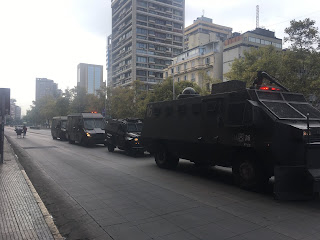I am sure my sporadic blog posting must be confusing if not frustrating. I have become an opportunistic blogger; preying on WiFi whenever and wherever I find it. Among the questions that have been fielded I thought all of them were very good. I really enjoyed answering them because more than a few touched on aspects of life I have either just accepted mindlessly or have not even considered. Answering questions helps to reflect and brings about a mindful attitude going forward. I almost forgot to post some pictures on my last post. I know
that I keep referencing the WiFi issues, and to give you some idea of the
sitch here, it took me 45 minutes to upload a 2 minute, 12mb video to YouTube
for an assignment. This reality puts the speed of campus wide WiFi into
perspective. However being without phone service and WiFi for most of the day helps to live in the moment which is something I did not expect to experience as a result of less wifi.
Something else that I failed to mention was my use of Spanish words interlaced
with my English blog posts. I decided to do it because I wanted to show an
experience of mine that cannot be expressed in just a description or a
photo. On top of that, I am unable to give you
the constant buzzing of mosquitoes that have colonized my bedroom.
I also doubt that I
can show you the puzzle of stacked items it takes to keep my travel adapter
from falling out of the wall, which every day somehow requires a new
combination. Unfortunately, showing you the armies of ants I face off
every day in the kitchen is not an option either. The curiosity of itching a
bug bite in the middle of the day trying to figure out if it is a bed bug bite
or a mosquito bite is quite an experience I wish I didn't have so often. If these unique
experiences were just to happen on one day instead of everyday
basis, I don’t think I would be so grateful for and interested in
differences between my old home and my new one.
If anyone wants to experience my WiFi situation, turning
your phone on airplane mode and then waiting for a change in the wind is the
closest you can get. I would be surprised if my technique for getting WiFi--one
footed, jumping, nose to the ground, phone to the skies--can be expressed by
words much less pictures.
All this to say, I wanted to share an experience in a
different way. The way you read my blog posts and how you understand most everything,
and then get to guess using context and knowledge of cognates for unknown words is the way I carry on daily conversation in all aspects
of life here. I hope you found it frustrating because I
sure do.
I used to strive to learn every word and write everything down like a
good pupil as if knowing everything would be better. However, I have learned
that this technique of educated guessing is far superior. Not only does it not
require a pen and paper, but it either lends an accomplished feeling of a
correct guess or a funny misinterpretation that makes everyone laugh. I will
say that the majority of cases end in laughter though. Through this, I have
learned that although the language barrier exists, you don’t always need a
ladder to get over it; sometimes you can just go right through it.
I have shared some daily experiences that could be interpreted as
negative by outsiders. When these experiences happen to me I am reminded that I
am more than just a tourist, and I am achieving a level of immersion that is
unique to me and my peers studying along with me.
I want to share some objectively positive experiences to show an even
coin.
I will say that sharing mate, a tea that is unique to South
America, with people is a highlight of everyday life as both a caffeine and conversation starter; it has proved to be quite the asset. My experiences
greeting people in Spanish are much different than my experiences greeting
people in English. One can be honest on how things are going with Spanish
greetings and it is not taboo; which is another genuine breath of fresh air apart from the air of the
Andes. While you would be hard pressed to find non-insect-burrowed fruit,
the fruit here is all organic and is so fresh you can tell the difference. I
will say that I have been eating plastic tomatoes most of my life and I never
knew how tomatoes really should taste. I had real, fresh sea food and sushi for
the first time in Chile, both experiences have made me question the integrity
of the same foods offered at an unnamed cafeteria hahaha. The concept of
sharing goes beyond just mate and reaches food as well. This experience will
bring you closer, literally and metaphorically whether you like it or not, to
the other people at the table. I will admit it did take some getting used to.
Being able to
give someone the complement of "Your English is good" is a
good way to get a smile and is a big compliment coming from a gringo. This
is another reflection of the importance placed on English and the esteem given to
the western way of life. I do not believe that western traditions necessarily
deserve all the distinction especially when they replace or erase cultural
traditions that define a people´s way of life. I am coming from the inside out
on this phenomena, whereas most here are seeing it from the outside in. These
are just a few of the many daily experiences that have made and continue to
make my life here a daily routine of friends and laughter.
While I may be at my peak with Spanish I am also peaking in charades abilities. This is because much like my debit card, my accent is not
always accepted and so I resort to hand gestures and pointing which at times
can slow down getting through border security.
Here is a classic story of an educated
guess gone wrong. In the small mountain city of Ushpallata I ordered an alfajore,
a small divine desert eaten at all hours of the day here, and a submarino; what
I believed to be a submarine sandwich. Well I got my alfajore, and along
with it I got a cup of boiling milk and a dark chocolate bar. I asked the
barista to make sure "Un submarino?" you can imagine my face
filled with confusion. The barista nodded reassuring me and so I sat down to
eat and to figure out where I went wrong. While I was thinking about it, I ate
the dark chocolate and in my last bite I realized that the submarino was no sub
sandwich, it was supposed to be an actual submarine. I should have dropped the
dark chocolate into the boiling milk as if it was a submarine but by the time I
realized it I had eaten it. I tried to achieve a similar effect with my
alfajore but I couldn´t fit it into the cup. If anyone was wondering...boiling
milk alone is not anything special.
In my time so far, I have been traveling within the
province of Mendoza and beyond with two trips to Chile visiting Santiago and
Valparaiso. My next adventure will be in Bariloche where there are more trees
than people. Here
are some pictures.
The Argentine Embassy in Mendoza
View of Potrerillos Dam
Rafting through a school program
Just about barfed on this one
Indiana Jones-esque bridge that was surprisingly stable
Un Camion that turned over on a 2 track road in the middle of the Andes. Our tour had to stop for an hour. Two kilometers of backed up traffic.
Puente del Inca: I recomend reading into this
Example of Chilean Police, known for being highly militarized, by far the most respected police force I have ever been in contact with.
Abstract art at an art museum
Train at a outdoor train museum
The sports club for rowing, swimming and everything under the sun.
Circus show that was in town.
A Gringo squeezing oranges by hand in an interactive art museum
La moneda (treasury) building in Santiago, Chile
View from Valparaiso
Parapentes in the Andes

Vendimia fest- celebrating the wine harvest with dance and rock and roll
Climing in the province of Cordoba
A snow tiger in Cordoba
A preserved grasshopper I found in a mountainside cave


















